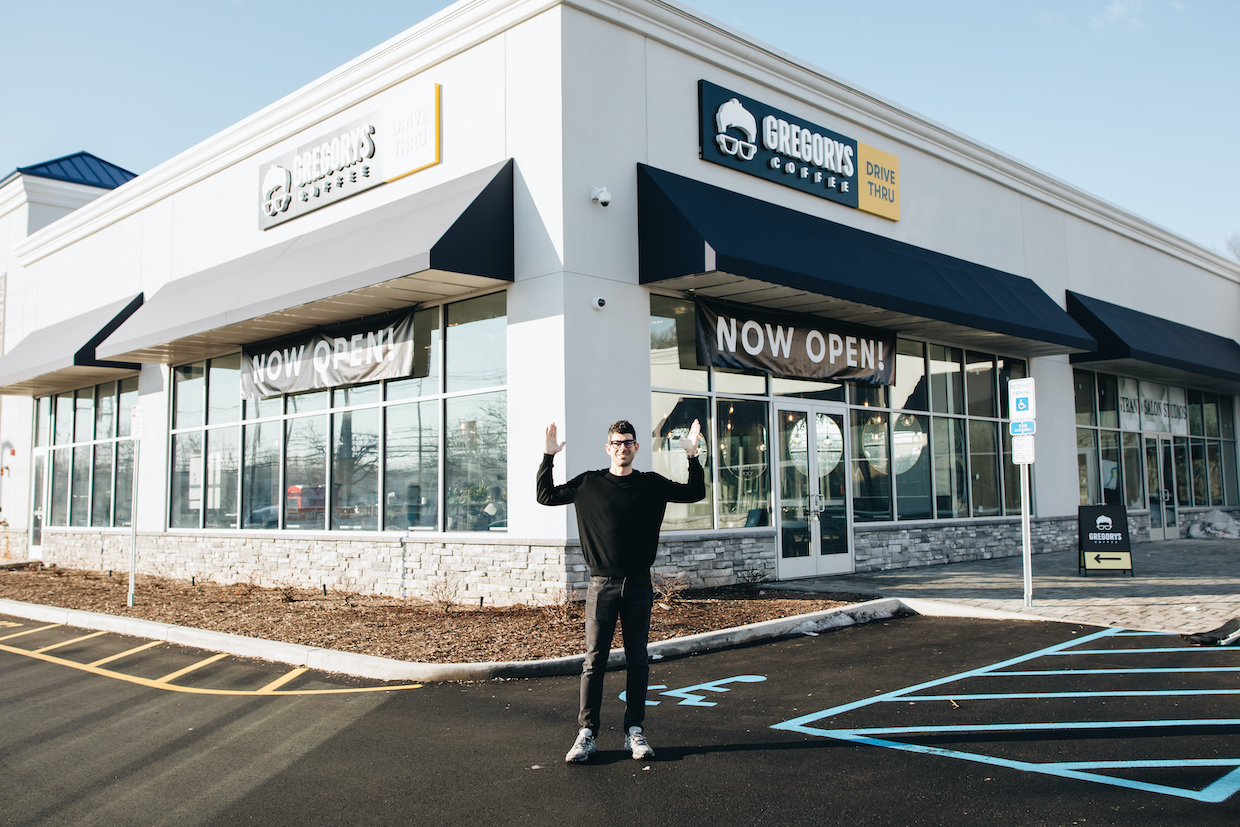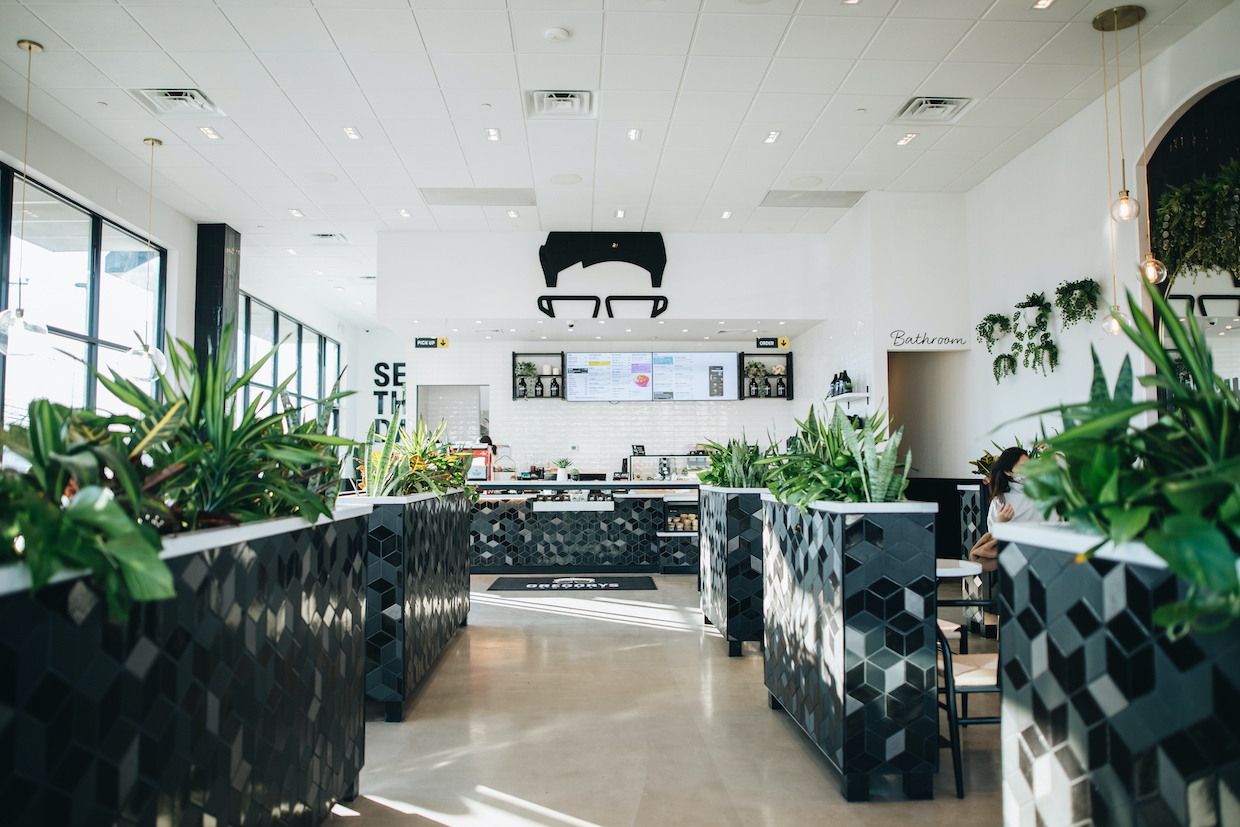
Gregorys Coffee Founder Gregory Zamfotis outside the company’s first drive-through location, recently opened in Paramus, New Jersey. Courtesy photo.
About a decade and a half ago — when the concept of slowness in some manual-brew-loving specialty coffee circles was firmly associated with superior quality — a bespectacled New Yorker named Gregory Zamfotis was leaning full-throttle into another concept for specialty altogether: speed.
That effort has now led to legions of “Gregulars” visiting a whopping 38 Gregorys Coffee shops in New York, New Jersey and Connecticut, including a newly unveiled drive-through location in Paramus, NJ.
It’s been a long journey since Zamfotis, along with the help of his New York food business father, launched with a single Gregorys Coffee location in Manhattan in 2006.
Zamfotis has arguably always existed on the cutting edge of an inevitable trend in specialty coffee — one that has become especially apparent in the pandemic era — through the blending of two distinct concepts: quality and convenience.
Also, unlike traditional fast-food or QSR models, which typically rely on highly processed and often unhealthy fare to keep costs down, Gregorys Coffee has managed to build its business with an expanded lineup of health-conscious and vegan food offerings, while introducing tricks like cutting out corn syrup by developing an in-house date syrup.
Coffees, meanwhile, continue to come from Gregorys’ roastery in Long Island City, which launched with a vintage Probat UG-22 alongside a larger-capacity Probat machine in 2016.
We recently reached out to Zamfotis to discuss the latest goings on with the now-iconic New York coffee brand.
[Editor’s note: Portions of this interview have been shortened or gently edited for style and clarity.]
Daily Coffee News: You’ve long talked about maintaining efficiency alongside quality, which in an era of “specialty instant,” order-ahead apps, pandemic-proven drive-throughs, etc. seems like a good bet. In what key ways have your efficiency protocols in the retail shops developed over the years? How are you maintaining it at scale?
Gregory Zamfotis: Speed and efficiency are core to who we are, so we are constantly evaluating our protocols to find how to improve as we innovate. A key shift we made during covid was to migrate our bakery program from a centralized location to baking fresh in each of our stores. We still make the products from scratch ourselves, but now we bake fresh throughout the day in each cafe. This allows us to better stock our bakery case, and also improved quality by eliminating any issues during transportation. In everything we do, we believe in challenging the status quo. As we grow, we are determined to improve along the way.
Can you share how the menu design and shop layout affect efficiency?
These elements are crucial to our success every day. We thoughtfully curate our menu to include unique and one-of-a-kind items but always through the lens of making sure we aren’t rolling in an item that will disrupt our workflow in a material way. We listen to our team to make sure when we update a menu, there is buy-in from all the folks involved.
Similarly, our stores must be laid out in a way to allow for queuing as well as making it easy for order ahead pick up. As more and more of our Gregulars are ordering ahead, we want to be sure they have a quick and easy path to gather their order and get on their way. We don’t get things right the first time, every time, but we will be damned if we don’t learn from our mistakes and get better with each and every build.
Obviously, staffing and retention are huge issues among businesses of all kinds these days. How are you managing that?
This begins and ends with culture. We aim to build a culture of truth, trust and inclusion. We think about our people as people, not baristas, and aim to see them for who they are and help make a great environment for them to succeed. We often onboard new team members through word of mouth or recommendations from existing staff members.
What are your current growth plans?
We recently opened a true specialty coffee drive thru in Paramus, NJ. We couldn’t be happier with the results and have been getting fantastic feedback from folks who just can’t believe they now have access to quality coffee and food like ours at a drive thru. We aim to open many more drive thru locations in the future as a part of our robust growth plans!
In coffee, where do you see the lines drawn between fast-food (QSR) and specialty coffee retail? Where are the distinctions between the two?
There is a lot to learn about true QSR. There is a reason they are so popular! Convenience, speed, accessibility are all things that QSRs do a phenomenal job at. Often specialty coffee can feel exclusive and that is a problem we aim to solve. Specialty coffee doesn’t have to be slow and expensive, we see coffee differently. We make quality that is accessible.
As an undergraduate student, you majored in finance with a minor in philosophy. How did you land on those two?
I genuinely thought I would pursue a career in banking upon matriculating at Boston University. With that in mind, a concentration in finance was the way to go. Along the way, I really enjoyed studying philosophy, particularly the ancients, and decided to spend more time doing so.
You followed that up with law school. Was there something about law school that made you want to go into coffee?
There was not a direct correlation between law school and coffee. Instead, it was a realization that I would rather pursue a passion as opposed to pursuing a job… I was capable of practicing law, I just didn’t love what I was doing. I love creating things with my hands, interacting with people and making connections. Coffee has given me the ability to do all of those things every day for the last 16 years.
Obviously, the coffee industry has some pressing social, economic and environmental sustainability challenges. As the business has grown, and thereby ostensibly touched more supply chain actors, how have your views towards sustainability in your own supply chain evolved?
With the C-price of coffee moving so much, it always begs the question, “How does this impact those at origin?” Macro economic factors can have a massive impact on the livelihoods of so many in the coffee industry… One example of something we did in 2019, was signing a multiyear agreement to purchase coffee from Fazenda Lagoa in Brazil. We committed to buying coffee from them for a long time, no matter what the C was doing, and it gave them comfort and predictability in their business. We were happy to do it because not only do we love their coffee, but we love them!
Lastly, here are the three questions:
Three Questions with Gregory Zamfotis
What excites you most about coffee?
The future! It is exciting to see how specialty coffee has continued to develop, and now with the proliferation of cold coffee, there are many new doors we can open. We use coffee as an ingredient in making great beverages. When you start with quality coffee you can really build on top of it with interesting and unique creations that people love.
What troubles you most about coffee?
The stress at origin to continue to improve and adjust without the guarantee customers will pay the premium they need to make those changes. If there was more transparency and widespread awareness of these challenges it could go a long way to eradicate many of these norms which can, at times, be a blemish on our amazing industry.
What would you be doing if it weren’t for coffee?
This is really hard to imagine since I truly love what I do. However, if I had to choose I would probably be working in fitness. I have a deep passion for wellness and taking care of your body.
Nick Brown
Nick Brown is the editor of Daily Coffee News by Roast Magazine.







Comment